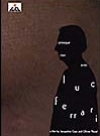"Presque Rien avec Luc Ferrari"
 This documentary is a fascinating glimpse into the life, works and working methods of the late, great composer. The footage is all taken from the period prior to Ferrari’s death but despite a lack of archival video footage, this film is full of fantastic insights and sounds from all across his career. Due to Ferrari being such a fun subject, the film is as entertaining as it is spellbinding.
This documentary is a fascinating glimpse into the life, works and working methods of the late, great composer. The footage is all taken from the period prior to Ferrari’s death but despite a lack of archival video footage, this film is full of fantastic insights and sounds from all across his career. Due to Ferrari being such a fun subject, the film is as entertaining as it is spellbinding.
Hearing (or reading when the French he uses becomes too difficult!) Ferrari describe his compositions is illuminating to say the least. Presque Rien shows how ensembles are primed on how to play a piece in the way Ferrari wants. As his music would suggest, his good humor (“I must say, I enjoyed myself”) balances the precision he demands from the musicians. A particularly fun scene comes early on with a small orchestra stomping about in time to the music during rehearsal. In a world where contemporary music is often seen as overly serious and sterile (not my opinion obviously but it is something often encountered), this refusal to keep a straight face is endearing.
The autobiographical details are essential, especially considering no biographer has tackled Ferrari in any great detail. In his own words (read by Jacqueline Caux which is an interesting twist when he is describing his relationship with women), he describes his early embrace of the avant garde, in particular serialism, before rejecting the dogma of his contemporary experimentalists. Yet the warmth with which he describes meeting Edgar Varèse and John Cage shows that he was no contrary young artist, he simply did not like being pigeonholed. His interest in standing apart from society manifests itself later in his recording career with his focus on political demonstrations and documenting civil unrest.
One thing that usually annoys me about music documentaries is how the music itself is often left as background noise, the interviewees talking over it. Presque Rien does the right thing in letting the music speak for itself. The music featured covers a lot from his last few years but there is a wealth of old material here too including some fantastic segments of musique concrete from his time with the two Pierres (Schaeffer and Henry). Elsewhere, his justification for working with found sounds reflects his aforementioned light-heartedness; the use of these sounds in his work is not purely for novelty value but to add a human touch to his art. The texture, the sensuality and the emotional impact of these sounds are critical factors.
There seems to be a steady trickle of Ferrari releases since his death and most focus on his more recent material. This DVD and the album also reviewed this week redress the balance somewhat but, as this film suggests, Ferrari’s work is a hugely important influence on 20th century music and it is high time that someone starts a comprehensive reissue campaign.



